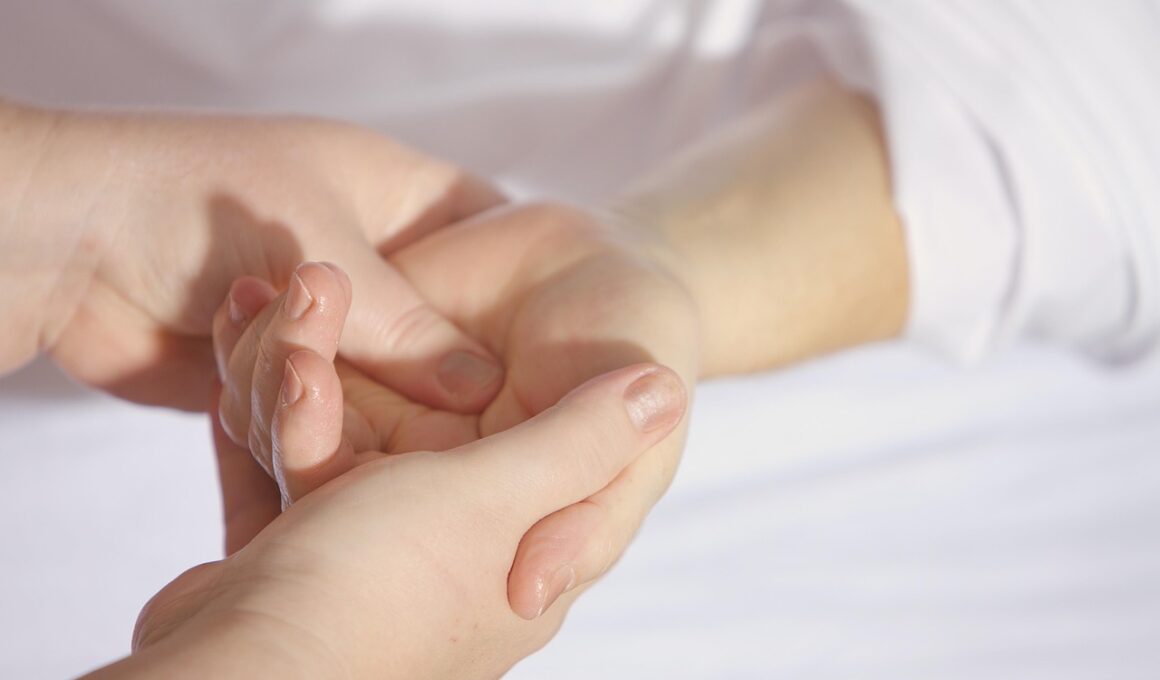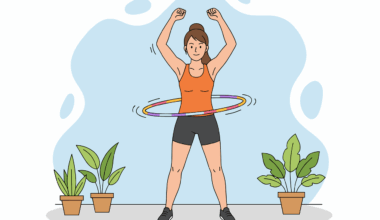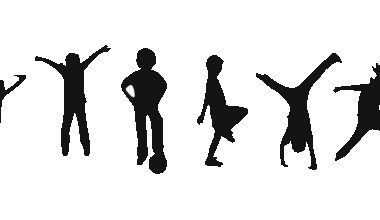Essential Recovery Techniques After Fitness Competitions
Post-competition recovery is essential for athletes to maintain their fitness levels and prevent injuries. Following a rigorous fitness competition, your body experiences stress that needs to be addressed promptly. First, establish a cooldown routine to gradually lower your heart rate, helping to prevent blood pooling in the extremities. This can include light jogging or walking for several minutes. Additionally, proper nutrition plays a pivotal role in recovery. Focus on replenishing carbohydrates and proteins through balanced meals that support muscle repair. Hydration cannot be overlooked; drink sufficient fluids to rehydrate your body, considering electrolyte replacement if necessary. Listening to your body is vital. If you feel pain or excessive fatigue, allow adequate rest before jumping back into your exercise regimen. Consider integrating recovery techniques like foam rolling or massage to alleviate muscle tightness. These methods can improve blood circulation and enhance recovery rates. Incorporating gentle stretching can also help maintain flexibility. Finally, don’t forget emotional recovery; mental health is just as important in your fitness journey. Finding time to relax and reflect post-competition is crucial for overall well-being.
Nutritional Strategies for Faster Recovery
Your diet plays a significant role in recovery, especially after significant stress like competitions. Protein-rich foods are essential for repairing damaged muscle tissue and are vital for recovery. Include options such as chicken, fish, legumes, or dairy to facilitate muscle healing. Carbohydrates also help replenish glycogen stores depleted during intense training and competitions. Whole grains, fruits, and vegetables are excellent sources. Don’t forget about fats; healthy fats like those found in nuts and avocados support overall health. Timing is key; aim to eat a balanced snack or meal within thirty minutes post-competition. This timing boosts recovery effectiveness. Drink fluids regularly during recovery. Consider electrolyte drinks if competition involved significant sweating. Rest is equally crucial; prioritize sleep over the next few nights to aid your body’s natural recovery processes. Take part in active recovery sessions like yoga or swimming at lower intensities to promote blood flow without exerting too much strain. Ultimately, nourishing your body with the right foods and maintaining hydration will set the foundation for quicker recovery and improved performance in subsequent competitions.
Physical therapies can significantly enhance post-competition recovery. Many athletes benefit from incorporating strategies such as physiotherapy into their routines. These therapeutic techniques can address lingering soreness and prevent future injuries. A certified physiotherapist can assess your specific needs and develop a tailored plan. Incorporation of cryotherapy and contrast baths can reduce inflammation and promote healing. Cryotherapy exposes the body to extreme cold, while contrast baths alternate hot and cold treatments that stimulate blood flow. Another effective method is deep tissue massage, which helps to break down muscle knots and alleviate tension. Considerations should also include implementing preventative measures; focus on strengthening exercises for vulnerable muscle groups that may be prone to injuries post-competition. Instruction from a qualified trainer can ensure proper techniques to minimize injury risk. Furthermore, keeping an injury journal can be beneficial. Documenting any sensations or issues during recovery allows you to discuss them with healthcare professionals accurately. This holistic approach combines both physical recovery techniques and preventative strategies, ensuring your body can bounce back effectively and prepare for future competitions.
Importance of Rest and Sleep
Rest and sleep are foundational pillars of recovery after demanding fitness competitions. Adequate rest allows your body to repair and rebuild muscle fibers that endure stress during competition. Several recovery mechanisms occur during sleep; deep sleep stages release human growth hormones, crucial for muscle recovery and regeneration. Prioritizing sleep must be a part of your routine to maximize recovery benefits. Consider methods for improving sleep quality, such as maintaining regular sleep schedules, optimizing your sleeping environment, and limiting caffeine consumption before bedtime. Reducing stress through mindfulness practices can enhance sleep quality as well. Incorporating scheduled rest days within your training program helps prevent burnout and overtraining. During these rest days, focus on passive recovery activities, such as light stretching, reading, or leisure walks. At the same time, find a balance between activity and rest, ensuring you do not feel stagnant while also listening to your body’s need for relaxation. Ultimately, the synergy between adequate rest, quality sleep, and active recovery strategies will minimize injury risks and enhance overall athletic performance in future competitions.
Social support plays an often-overlooked role in recovery after fitness competitions. Engaging with training partners, coaches, or family members can provide encouragement and motivation during recovery battles. Social connections can encourage active recovery practices and accountability for rest. Consider joining group sessions or community events to foster social interactions post-competition. Sharing experiences and recovery tips with fellow competitors promotes a sense of belonging and support while relieving pressure often associated with competition. You may find yourself motivated by group workouts or social sports, which can also facilitate physical recovery through gentle movement and camaraderie. Specialized recovery groups can share insights and experiences, creating a safe space for discussing challenges in recovery. These connections not only enhance mental well-being but can also serve as networks when seeking advice on training adjustments or recovery strategies. When dealing with the emotional aftermath of competition, recalling shared experiences can provide comfort and perspective. Don’t underestimate the power of positive influences; cultivate relationships that foster encouragement and motivation. Together, you can embrace recovery as part of your athletic journey, turning a demanding experience into an opportunity for growth.
Monitoring and Adjusting Recovery Progress
Recovery isn’t a one-size-fits-all approach; monitoring your progress allows for necessary adjustments based on your body’s response. Tracking can involve simple methods, like journaling daily experiences regarding pain, soreness, and energy levels. Consistency in assessments enables you to gain insights into your recovery patterns. Post-competition fatigue can vary based on personal and environmental factors, which may demand different recovery strategies. Keep an open line of communication with coaches and health professionals to fine-tune your recovery plans. This collaborative approach can identify successful practices or areas needing refinement. Implementing tools such as wearable technology can assist in monitoring vital stats, identifying overtraining signs, thus enabling proactive adjustments. Regularly scheduled reassessments of your recovery strategies ensure that they remain effective, making it easier to adapt based on your healing process. Be mindful of how your body feels during workouts, and if you notice consistent fatigue or pain, it might indicate the need for an extended recovery period. Engage in open discussions surrounding your experiences with recovery to navigate changes seamlessly while prioritizing your mental and physical health.
Incorporating recovery into your post-competition routine is essential for longevity in fitness. Rather than viewing recovery as an afterthought, integrate it as a vital part of your training plan. A proactive approach, emphasizing recovery techniques enhances performance and prevents potential future injuries. It’s beneficial to create a recovery template, committing specific days and activities solely to healing. This can include everything from nutrition planning, social engagements, and relaxation techniques to physical therapies. Schedule these recovery practices thoughtfully in relation to your competition calendar. Ensure to leave ample time post-events for your body to recuperate effectively. Remember, the goal isn’t merely to recover but to optimize your readiness for future competitions. Educate yourself on various recovery modalities, staying open to explore what resonates with your unique needs. By doing so, you’ll cultivate an understanding of your body’s responses and develop a responsive recovery routine tailored to maintain peak performance. Ultimately, every athlete learns that their best results stem from a combination of hard work and effective recovery strategies, setting the stage for sustained success in their fitness journey.
In conclusion, committing to effective recovery strategies post-competition is fundamental for any athlete in sports. Recovery’s multifaceted nature incorporates physical, nutritional, emotional, and social considerations. By following innovative practices and adhering to informed strategies, athletes can enhance their recovery timelines and minimize injury risks. Remember that effective recovery is not an isolated process; it requires careful planning, routine integration, and openness to adjustments. It’s crucial to cultivate supportive environments and relationships that foster your recovery journey. Balancing rest with active recovery practices can facilitate optimal healing while maintaining training momentum. Assessing your body’s response to recovery efforts enables the development of personal strategies for maximum effectiveness. Training is paramount, but recovery is equally critical for achieving long-term athletic goals. As you implement these recovery techniques, be patient with yourself and appreciate your body’s incredible ability to heal. Emphasizing a positive mindset throughout your recovery journey will promote mental resilience and the well-being of athletes. This holistic approach to post-competition recovery paves the way for sustained athletic performance and continued personal growth in fitness endeavors.


